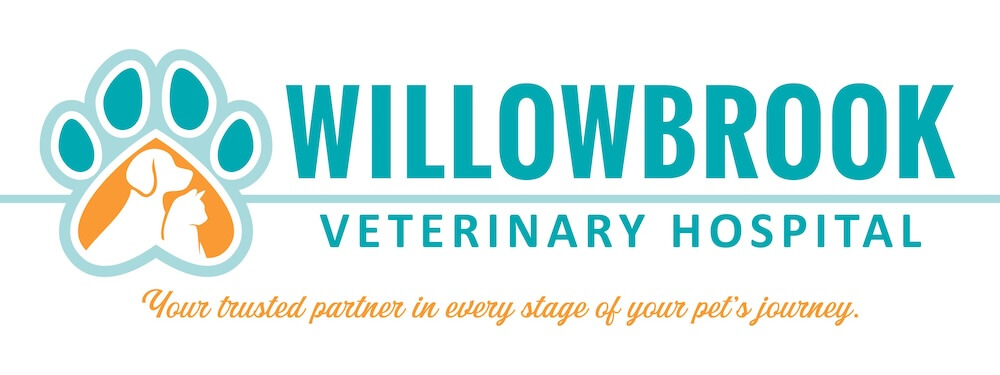Dog Wellness Exams at Willowbrook Veterinary Hospital
Keeping your dog healthy starts with regular preventive care. Wellness exams help us catch problems early, track your dog’s health over time, and provide personalized recommendations to keep your furry friend thriving.
What Is a Dog Wellness Exam, and Why Is It Important?
A wellness exam is a routine check-up that focuses on preventive care rather than treating illness. It allows us to assess your dog’s overall health, detect early signs of disease, update vaccinations, and discuss nutrition, behavior, and lifestyle. Even healthy dogs benefit from regular exams to stay ahead of potential problems.
What Does a Dog Wellness Exam Consist Of?
During a wellness exam, our veterinarian will:
- Perform a full physical exam (eyes, ears, mouth, skin, heart, lungs, abdomen, joints)
- Check your dog’s weight and body condition
- Listen to your concerns about your dog’s health, behavior, or diet
- Review vaccine history and administer any needed vaccinations
- Discuss parasite prevention (fleas, ticks, heartworm)
- Recommend lab work based on your dog’s age and risk factors
How Often Should My Dog Have a Wellness Exam?
- Puppies: frequent visits, every 3-4 weeks for vaccines and growth monitoring.
- Adult dogs (1–7 years old): every 6 months
- Senior dogs (7+ years old): every 6 months, but may need more frequent visits depending on specific health concerns
What Should I Expect During a Routine Wellness Exam?
Expect a thorough head-to-tail evaluation, a conversation about your dog’s daily life, and recommendations tailored to their age, breed, and health status. Most visits take 30–60 minutes.
What Happens if the Veterinarian Finds Something Abnormal?
If we notice anything unusual—such as a lump, heart murmur, or abnormal lab results—we’ll discuss next steps. This may include additional testing (e.g., X-rays, bloodwork) or treatment options to address the issue early.
What Vaccinations Should My Dog Receive During a Wellness Exam?
Core vaccines are recommended for most dogs:
- Rabies
- Distemper/parvovirus/adenovirus (DA2PP)
- Bordetella (kennel cough)
- Leptospirosis
- Depending on your dog’s lifestyle, we may also recommend:
- Lyme disease
- Canine influenza
We’ll review your dog’s risk factors to build a customized vaccine plan.
How Can I Prepare My Dog for a Wellness Exam?
- Bring a list of any questions or concerns
- Bring a fresh stool sample for parasite screening
- Keep your dog on a leash or in a carrier
- Try to avoid feeding a large meal right before the visit
How Much Is a Wellness Exam for a Dog?
Wellness exams vary, depending on your dog’s age, specific health conditions and necessary testing. We’ll provide an estimate if additional services are needed.
Will My Dog Need Any Blood Tests or Lab Work?
We recommend annual baseline lab work in all adult dogs at least annually. We may recommend some tests more frequently, especially for senior dogs or those with chronic health conditions. Lab work helps detect hidden problems like kidney disease, diabetes, or anemia before symptoms appear.
What Common Health Issues Can Wellness Exams Help Detect?
- Dental disease
- Ear infections
- Skin conditions
- Arthritis
- Obesity
- Heart disease
- Tumors or growths
- Early signs of organ dysfunction
Early detection can mean more treatment options and better outcomes.
How Can a Wellness Exam Help Manage My Dog’s Weight?
We’ll assess your dog’s body condition score, discuss nutrition and feeding habits, and recommend diet adjustments or exercise plans if needed to achieve or maintain a healthy weight.
What Should I Bring to My Dog’s Wellness Exam?
- Medical records if your dog is new to our hospital– Please have records to our clinic within 24 hours of your appointment so our veterinarians can review your dog’s medical history
- A list of current medications, supplements, or flea/tick preventatives
- A stool sample (if requested)
- Any questions you’d like to ask
How Can I Ensure My Dog Stays Calm and Comfortable During the Exam?
Bring treats, a favorite toy, or a calming aid if needed. Let us know if your dog is nervous—we can use gentle handling techniques, calming pheromones, or schedule a longer appointment to reduce stress. For those dogs with higher stress and anxiety, we will often recommend pre-visit calming medication to allow for a better experience for them.
Can a Wellness Exam Detect Early Signs of Serious Diseases?
Yes—wellness exams are designed to catch subtle changes before they become serious. Routine screenings can identify early kidney disease, liver issues, heart disease, cancer, and more.
What Questions Should I Ask My Veterinarian During the Exam?
- Is my dog’s weight healthy?
- Are there vaccines or preventives my dog needs?
- Should I update my dog’s diet or exercise routine?
- Do you see any signs of dental or joint problems?
- When should I schedule the next exam?
We encourage open communication to keep your dog as healthy as possible.
What Follow-Up Care Might Be Necessary After a Wellness Exam?
If any concerns are found, we’ll recommend follow-up visits, additional testing, or treatments. We’ll create a care plan to monitor or address any issues.
Is There a Specific Senior Wellness Exam for Dogs?
Yes—senior dogs benefit from more frequent exams and additional screenings (such as bloodwork, urinalysis, or X-rays) to monitor for age-related diseases like arthritis, organ decline, or cancer.
Wellness exams are the foundation of a long, healthy life for your dog.
If you have questions, we would love to answer them for you. Please give us a call at the office at (503) 968-2911, or you can email us at [email protected]. Our staff would love to talk with you!
